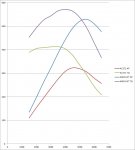achris
More fish than mountain goat
- Joined
- May 19, 2004
- Messages
- 27,468
Hi all,
I just ran across this brilliant little graph... It shows the same engine with different cam/head and intake configurations to change the engine from 375hp to 400hp. I don't know what engine it is, or how the configuration is set up, so please don't ask, or denigrate me for that.
What it does point out, very starkly, is how trading off just 25hp at the very top end has huge benefits in the mid-range. Not only does the mid-range benefit between 50 and 100 hp, but the maximum power is reached at a lower engine speed. In fact, the 400hp engine doesn't even catch up to the 375hp engine until almost 5,500rpm!
Now, truthfully, how many of us run our engines at 5,500rpm or higher for most of the day? (And anybody who does say they do, I'll call BS!) Most of the time, most boat engines are running between 2,500 and 4,000rpm. And in that range, the 375hp engine is WAY better. And on this engine, at 2,000rpm (probably the speed you'd be using to get out of a harbour, or when the weather kicks up) the 375 is producing a whopping 150hp more. And given that when we 'prop' an engine, we do it for maximum power, this boat with the 400hp engine will be difficult to drive in the mid-range due to be 'over-propped' for the revs.
Here's the graph....

Something to think about when we next see a thread with someone wanting 'more power'... A case of less is more? (maybe the engine suppliers, Merc and Volvo et al, do know a thing or two about what they're doing? )
)
Chris..........
I just ran across this brilliant little graph... It shows the same engine with different cam/head and intake configurations to change the engine from 375hp to 400hp. I don't know what engine it is, or how the configuration is set up, so please don't ask, or denigrate me for that.
What it does point out, very starkly, is how trading off just 25hp at the very top end has huge benefits in the mid-range. Not only does the mid-range benefit between 50 and 100 hp, but the maximum power is reached at a lower engine speed. In fact, the 400hp engine doesn't even catch up to the 375hp engine until almost 5,500rpm!
Now, truthfully, how many of us run our engines at 5,500rpm or higher for most of the day? (And anybody who does say they do, I'll call BS!) Most of the time, most boat engines are running between 2,500 and 4,000rpm. And in that range, the 375hp engine is WAY better. And on this engine, at 2,000rpm (probably the speed you'd be using to get out of a harbour, or when the weather kicks up) the 375 is producing a whopping 150hp more. And given that when we 'prop' an engine, we do it for maximum power, this boat with the 400hp engine will be difficult to drive in the mid-range due to be 'over-propped' for the revs.
Here's the graph....

Something to think about when we next see a thread with someone wanting 'more power'... A case of less is more? (maybe the engine suppliers, Merc and Volvo et al, do know a thing or two about what they're doing?
Chris..........




















